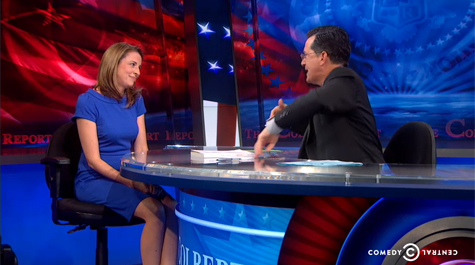Professor Larsen Discusses Amicus Facts With Stephen Colbert
What does scholarship on amicus facts and the Supreme Court get you? If you’re Allison Orr Larsen, it gets you an invitation to Colbert Nation.
On the First Monday in October, no less.
Larsen, a law professor at William & Mary Law School, appeared Monday, Oct. 6 on Comedy Central’s late-night talk show The Colbert Report starring Stephen Colbert [watch video]. On the docket was her research about The Trouble with Amicus Facts, which was published in the Virginia Law Review and recently featured in the New York Times.
The appearance was timely. October 6 was the first day of the new Supreme Court Term, and Colbert--who in typical spoofing fashion admitted to being a longtime subscriber of the Virginia Law Review--wanted an expert who “blows the lid off the Supreme Court’s reliance on something called amicus curiae, or friend of the court briefs.”
Citing Larsen’s claim that the number of amicus briefs filed at the Court is at an all-time high, Colbert began by helpfully defining amicus curiae as ‘informational documents written by third parties who are not involved in the situation, whose opinion was not sought, but still want some say in the decision.”
Or, as he put it, “the legal equivalent of grandparents.”
Colbert then began discussing amicus briefs that make factual claims to the Court by asking, “What’s wrong with being friendly?”
“Today anyone can be a factual expert, or claim to be,” Larsen said. “But if all of those assertions are being made to the court in dozens and dozens of briefs, it’s hard for them to tell which ones are reliable and which ones are not.”
Larsen said that the real problem is that amicus briefs come in at the eleventh hour and are untested, or just support the preexisting point of view of organizations that lobby and file amicus briefs.
“When you want an expert witness at a trial, you don’t let anybody come to the courthouse steps to testify,” Larsen added. “There’s a system in place for deciding who can be the real expert at that point in time.”
Colbert, who admitted to getting all his legal research from “cached Geocities pages from the 1990s”--ended the segment by asking if all Supreme Court justices cite amicus briefs in support of a preexisting world view.
Larsen answered in the affirmative. And yet they still complain when their colleagues do it, she said.
“Even Justice Scalia?” Colbert asked.
Even Justice Scalia.
"Oh, that’s Antonin,” Colbert slyly remarked.
About William & Mary Law School
Thomas Jefferson founded William & Mary Law School in 1779 to train leaders for the new nation. Now in its third century, America's oldest law school continues its historic mission of educating citizen lawyers who are prepared both to lead and to serve.
